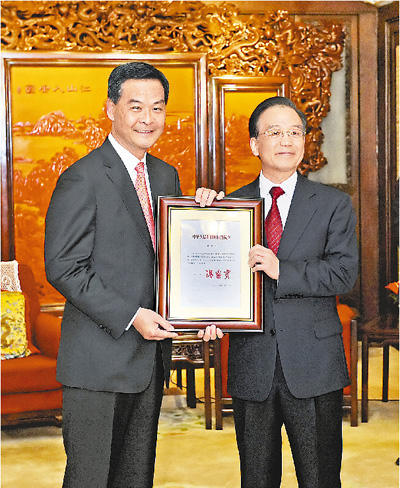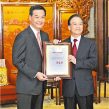
Hong Kong’s Chief Executive Election Reveals Rift with Beijing
Publication: China Brief Volume: 12 Issue: 8
By:

Although relations between Hong Kong and mainland China have never been trouble-free, the past few months have been marked by unusual antagonism. The souring of the relationship portended trouble for Beijing in the recent chief executive race, which ended on March 25. Beijing’s preferred candidate, Henry Tang, was so damaged by criticism that it switched its support to another candidate at the eleventh hour. Like former chief executives, Tang is loyal to the mainland and Hong Kong’s tycoons. His election would have meant a continuation of the status quo, which has not been particularly good for the average Hong Kong resident. As Hong Kongers’ fears of more-of-the-same politics grew, so did feelings of insecurity about their future as part of China and the sanctity of Beijing’s promises for “one country, two systems.”
Tensions have been simmering for some time in Hong Kong, but the most recent spat started in December 2011 with the release of results from an annual Hong Kong University poll. Each year, the university conducts a poll to determine how Hong Kong citizens identify themselves. The latest results found that only 17 percent of respondents describe themselves as Chinese, a 12-year low, whereas those identifying as Hong Kongers is at a 10-year high [1]. An official in the Central Government Liaison Office in Hong Kong reacted harshly to the survey results, calling them unscientific and illogical (South China Morning Post, December 30, 2011). A commentary in the mainland-owned paper Wen Wei Po called the authors of the survey “hit men of the Hong Kong opposition force" and suggested they were pawns of U.S. Consul General Stephen Young and former Hong Kong Chief Secretary David Ford. Beijing frequently has accused Young, who previously served as the director of the American Institute in Taiwan’s Taipei office, of meddling in Hong Kong’s internal affairs and promoting democracy in Hong Kong (Wen Wei Po, January 14).
Relations grew testier in January when more than 1,000 people appeared outside a Dolce & Gabbana shop in Hong Kong to protest the store’s “policy” that only mainland tourists could take photos of the store. Speculation followed that a mainland official insisted that Dolce & Gabbana employees prohibit Hong Kong residents from taking photos because of concern that photos of him buying expensive goods would be released on the internet, suggesting that he is corrupt (The Standard [Hong Kong], January 9). Then, the following week, a mainland tourist’s child violated the law by eating a snack on Hong Kong’s metro system. A local resident commented on the infraction, which sparked an argument that was eventually stopped by a Mass Transit Railway (MTR) staffer. A cell phone video of the incident went viral.
In another incident, Kong Qingdong, a professor at Peking University and alleged descendent of Confucius, was angered by the criticism of the mainland tourists and called Hong Kong people “running dogs for British imperialists” and amoral The inflammatory comments caused Peng Qinghua, the Director of the Central Government Liaison Office in Hong Kong, to apologize publicly for Kong’s comments in (Wen Wei Po, February 1). Despite this, a group of Hong Kong citizens were so outraged that they took out a full page ad in Apple Daily that disparaged mainland citizens as “locusts” that deplete Hong Kong’s resources.
Mainland press coverage of these events tried to mitigate tensions by downplaying the episodes. A Global Times editorial urged both sides to cease engaging in offensive behavior, saying that “upping the ante on the verbal cross-fire is exaggerating the difficulties of integration between Hong Kong and the mainland” (February 4). A journalist formerly of China Daily’s Hong Kong office wrote an op-ed suggesting the Hong Kong people realize that they are now inferior to mainland citizens and suggested that their reactions stem from worry that they will lose their status (China Daily, January 20). Other articles highlighted the importance of China to Hong Kong’s well-being. For example, one report released one day after the publication of the locust advertisement stated Hong Kong’s economy would be weak in the beginning of this year due to slowing exports, but tourism from the mainland would temper any negative impact (China Daily, February 2).
A primary cause of the recent anger among Hong Kong residents is the use of Hong Kong’s resources by mainlanders. Birth tourism is one of the most visible examples of this. Large numbers of mainland women travel to Hong Kong to give birth so they can receive better medical care and obtain a Hong Kong identification for their child, entitling the child to Hong Kong’s resources, including public education. Last year, approximately 40,000 mainland women gave birth in Hong Kong, which caused hospital beds to be in short supply and required residents to book beds months in advance. In January, more than 1,500 Hong Kongers protested the increasing number of mainland babies born in Hong Kong hospitals (The Standard, January 16; Agence France Presse, January 15).
Both the Chinese government and the Hong Kong government are working to address the birth tourism issue, although they waited to do so until after the aforementioned events occurred. The Hong Kong government reduced the quota for the number of non-local mothers that can give birth in Hong Kong to 34,000 (The Standard, February 8; Xinhua, February 3). Beijing and Hong Kong officials agreed to work together to find “birth agents” who assist mainland women traveling to Hong Kong to give birth, and they have already made several arrests (Xinhua, January 22). In addition, Beijing has threatened that if women go to Hong Kong to give birth to a second child, they will be heavily taxed upon their return to the mainland for violating the one-child policy (Global Times, February 10).
Both governments also took limited steps to address the issue of rising housing prices, but the impetus for alleviating the high cost of housing came from China. After Beijing took notice of this problem—partly caused by mainland investors—the Director of the Hong Kong and Macao Affairs Office warned that there was a danger that the housing bubble could burst. This raised alarm bells and prompted the Hong Kong government to take quick action (China Daily, June 23, 2011).
Despite these steps to ameliorate problems relating to property speculation and birth tourism, many local residents remain wary of Beijing’s rule. Last year, Beijing proposed a “national education” plan to teach students about China’s development to build “affection for the country,” which many in Hong Kong viewed as brainwashing. Implementation of this curriculum has been delayed due to criticism (South China Morning Post, January 26). Academic freedom is highly valued in Hong Kong, as is freedom of the press, which is seen to be in jeopardy. The new editor of the South China Morning Post is from the mainland and is a member of the Chinese People’s Political Consultative Conference, prompting skeptics to suggest he will make the paper “red” (The Standard, February 2).
Hong Kongers concerns of Beijing’s growing influence in their city also were evident in the recent Chief Executive election. Previous elections were relatively quiet and proceeded as planned with Beijing’s preferred candidate easily winning the election, whereas this election had competition between candidates and particularly negative coverage by the press—even Vice President Xi Jinping called for the mud-slinging to stop (South China Morning Post, March 9). Henry Tang, Beijing’s initial favorite for chief executive, rapidly fell from grace as scandals marred his image. C.Y. Leung was not scandal-free and has even been accused of being a Chinese Communist Party (CCP) member. His more populist platform, however, may have prevented him from falling too far in the polls.
As a result of growing criticism and dislike of Tang, Beijing signaled it preferred Leung a few days prior to the election (South China Morning Post, March 21). Given that Chinese officials had called for the chief executive needed to be capable, popular and patriotic, Beijing’s decision to throw its support to Leung was not completely unexpected (The Standard, July 19, 2011). China recognizes it cannot ignore public opinion and growing discontent in Hong Kong. Moreover, Leung’s popularity should not be exaggerated. While Leung fared better than Tang in some polls, many in Hong Kong were skeptical of him; at best, he represented the lesser of two evils. In a mock poll conducted two days prior to the election that was open to the general public, 54 percent of those polled abstained from choosing any candidate [2]. Of course, those that voted in this mock poll are a self-selected group, but a significant portion of the 222,990 participants found all candidates unacceptable.
Supporting Tang for Chief Executive was a poor judgment call by Beijing in the first place. Backing a candidate with visibly strong ties to tycoons meant supporting the status quo at a time when Hong Kongers want to see change. Furthermore, Beijing failed to recognize that a free press could bring about Tang’s downfall. That Beijing did not select a candidate who legitimately cares about protecting Hong Kong’s interests and is relatively honest fuels worries that the rampant corruption present in Chinese politics will become a regular part of Hong Kong politics as well (South China Morning Post, March 25; New York Times, March 5).
After Leung was announced the victor, pro-democracy protestors who fear that the new chief executive’s alleged CCP membership will result in the stripping of Hong Kong’s freedoms pronounced that Hong Kong was “dead.” If Leung is unable to reassure residents that he will protect Hong Kong’s rights, protests will swell as they did nearly a decade ago.
At this point, Hong Kongers clearly want to remain distinct from the mainland. They do not want Beijing meddling in their politics nor do they want mainlanders to exploit their resources. They want what was promised to them under the “one country, two systems” framework—that their political and economic system would remain the same for 50 years after 1997 and that they would get fully democratic elections. The recent tensions can be summed up as resulting from fears that the framework is more about creating “one country” than it is about maintaining “two systems.”
Notes:
- “HKU POP releases latest survey on Hong Kong people’s ethnic identity,” The University of Hong Kong, December 28, 2011, https://hkupop.hku.hk/english/release/release884.html.
- “Results of ‘3.23 Civil Referendum’,” The University of Hong Kong, March 24, 2012, https://hkupop.hku.hk/chinese/release/release915.html.





